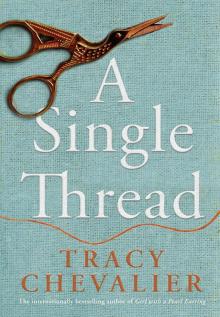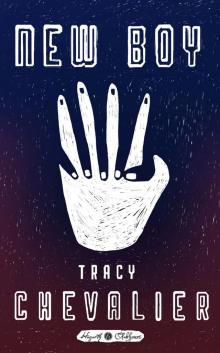- Home
- Tracy Chevalier
New Boy Page 6
New Boy Read online
Page 6
The other boys whistled through their teeth and laughed.
Osei didn’t grimace, or hit him, or walk away. Here was a straight talker. It was almost a relief to hear the prejudice out in the open. Now he could be open too. “This black boy is,” he said.
He was going to have to kick the hell out of that ball.
They lost the toss, so Ian’s team fielded first. Ian didn’t assign positions, but O automatically headed to the outfield where there was less action, knowing not to show off by taking first base or shortstop. He was content to wait it out in the long grass with the weaklings.
Like softball, kickball had four bases, and you had to go around them all to score a run. You were out if the fielders threw the ball you’d kicked to the base you were running to before you got there, or if you got tagged with the ball before you got to a base, or if you kicked the ball up and a fielder caught it before it touched the ground. If a team got three outs, it was the other team’s turn. Whichever team scored the most runs won.
A boy named Rod was first. He kicked the ball low and hard so that it shot between first and second bases to the fumbling outfielder on Osei’s left—a slow boy who grabbed at the ball and threw it so wildly it went to O rather than toward the infield. By the time he’d scooped it up and thrown it in, Rod had reached second base. There were groans from the team and a “Come on!” from Ian, but at least they were not directed specifically at O. There was nothing he could have done better.
It felt good to have touched the ball, though. After the first touch he always felt more confident.
The next boy kicked it short and high and Ian, who was pitching, caught it easily. One out. The boys after that did what any sensible player would do and took advantage of the weakest point of the team: they aimed deliberately at the boy on Osei’s left. The first time they did so the ball was on the other side of the slow boy—too far away for Osei to help him out—and the first baseman had to run and get it. Rod got to third base on that turn, and the kicker to first. The next kick, though, was high and hard and the weak boy stood under it with his arms wide, hopeful that he would miraculously discover his athletic ability and close his arms around the ball at just the right moment. Osei could have shoved him out of the way and caught the ball himself—there was plenty of time to make this calculation. But he didn’t: it felt wrong to muscle in on the weak boy, and it might not help either of them. So he ran over, stood, and watched the ball drop through the boy’s arms. Then he picked it up and threw it hard to second, where the baseman managed to tag the runner out. Second out, though Rod had run home to score.
That left just one runner on first when Casper stepped up to kick. Some boys you know right away will do well, even if you’ve never seen them perform before. Osei and the rest of the fielders took several steps back, out of respect for Casper’s ability, knowing he would kick it the hardest yet. He was honorable as well: he was not going to kick the ball toward the weak kid. O glanced over at the ship and saw that the girls were watching Casper, and felt a pang that someone else was getting all the attention, even a nice kid like Casper. Ian rolled the ball to him and Casper kicked it—high, high into the air, spinning and spinning and descending toward O. He hardly had to move—just a step forward to meet it and the ball landed hard in his arms, stinging his cheeks and thumping his chest, but he held on to it and didn’t let go and Casper was out.
Shouts erupted from his team. “Way to go, O!” someone called. Then he was carrying the ball toward Ian who was nodding and people were shouting his name and in the distance the girls were cheering and for a brief moment O shed the hyperawareness of his black skin and was just another shiny new hero on the playground.
As he passed by to go out to pitch, Casper said, “Nice catch.” There was no layer of jealousy or sarcasm beneath his words; he meant what he said. His straightforwardness and natural self-confidence were appealing. They also made O want to trip him up.
Osei did not assume that one good catch would make him the star of the team, nor that Ian would put him in one of the best positions in the running order of kickers: fourth or fifth, when the bases might be loaded and one good kick would bring in several runs.
And he didn’t do that. “You can obviously throw and catch,” Ian said as the team gathered at home plate. “But can you kick?” He gave O a long look with his murky gray eyes that were set so close together you felt off-kilter looking into them. Then he gestured to the plate, and O realized he was expected to go first.
It was not a crazy tactic. If you didn’t know how well someone would perform, you could take a chance on them going first and getting out and the team would still have more opportunities to score. Of course, if the first boy went up and kicked the ball far, that was a great waste, as he wouldn’t bring in any runs other than his own.
And that was what Osei was going to do. What he had to do. He couldn’t show he could throw and catch well and then kick poorly. He couldn’t even kick medium-well—enough to get to first base. He had to kick a home run.
As he walked up to the plate he heard a murmur cross the playing field, and was gratified to see the fielders all take several steps back. They were expecting great things of him. Dee and Mimi were now standing on the ship, watching. In fact, it felt as if the whole playground had come to a halt.
At the school in Rome, Osei had often been the goalkeeper when they played soccer; the other boys didn’t like having physical contact with black skin, and for the most part that could be avoided if he was in goal. In that position he had at least learned how to kick high and far. Normally a goalkeeper kicks a ball from standstill, so when Casper rolled the ball toward O unexpectedly fast, he took a split second to gauge it, then ran to meet it, and felt his toe connect, true and hard. It should go far.
It did go far. The ball soared over the heads of all the fielders, flew over the chain-link fence that bounded the playground, and bounced off the roof of a blue Oldsmobile Cutlass Supreme parked across the street. A cheer rose from the field, from the girls, from the whole playground—except for Osei’s team members. They groaned.
He looked around, puzzled by their response. “Is that not a home run?”
“It doesn’t count if it goes out of the playground,” Ian explained.
“Yeah,” Duncan added, “and we can’t play anymore if it does. Teachers’ rule. They hate having to go after it. Look, it’s gone all the way to Maple.”
The ball had rolled down the street, knocking into the wheels of parked cars, and was heading into an intersection, where drivers swerved and honked.
“I am sorry. I did not know.”
“You know you bounced it off of Casper’s parents’ car,” Ian added. “He lives right across the street.”
“Oh! I will apologize.”
Ian shrugged. He seemed more amused at O’s humiliation than angry that the game was over.
Not for long. Dee came running over from the ship. When she reached Osei she threw her arms around him. “That was amazing!”
O froze, and the rest of the kids on the playground did too: the cheers died, the buzz was silenced. Ian stopped smiling.
“She touched him!” Patty whispered in a mixture of awe and horror. A chorus of voices joined her.
“Not just touched—she hugged him!”
“Damn!”
“I wouldn’t do that—would you?”
“Do you think they’re going together?”
“They must be.”
“She could have any boy she wants and she chooses him?”
“Is Dee crazy or something?”
“I don’t know—he is kind of cute.”
“Are you kidding? He’s—you know!”
“Not only that—he’s new. She doesn’t even know him.”
“Yeah, he could be an axe murderer, or like that guy dressed as Santa who strangles the girl in Tales from the Crypt.”
“You saw that? My parents wouldn’t let me.”
“I saw The Exorcist too.
Snuck in with my older brother. Scared the hell out of me—especially that weird voice she talked in.”
Osei could not hear what they said, but it didn’t matter. They were all witnesses to a line he had never intended to cross.
Dee noticed when she was hugging him that Osei stiffened, and when she pulled away from his smooth arms she became aware of the rigid atmosphere around them. Mimi had her eyes fixed on the ground; the boys—Ian and Casper and Rod and the others—stood straight as soldiers, arms at their sides. Patty was shaking her head slightly. Dee had touched O, in front of everyone, and the disapproval of the entire playground and even, it seemed, of O himself, was so strong that she had to close her eyes to it. “Let’s go to the trees,” she said. Sanctuary.
The cypress trees were the most surprising feature of the playground. The designer must have had a soft spot for trees, and instead of tearing out the existing stand of cypress trees when the school was being built, they were left, the playground designed around them so that they towered over one corner. Perhaps to justify keeping them, a sandpit had been built there, which was never used for play—this was the older students’ playground, and digging in sand was something only younger kids did with any enthusiasm. Instead it became one of the few neutral places on the playground where boys and girls from all the grades went to hang out.
Dee led O to the trees and dropped to the sand. He hesitated, then joined her. As they sat side by side, the playground slowly began to revive. The boys got the kickball back and used it to play dodgeball—Ian and Rod throwing particularly hard and making red marks on the calves of the boys who wore shorts. Girls got on with hopscotch, and Mimi sat playing jacks with her classmate Jennifer not far from the sandpit. Blanca had begun jumping Double Dutch.
“That was such a great kick,” Dee remarked.
O shrugged. “But it hit Casper’s car. And it stopped the game.”
“Well, you didn’t know. Ian should have told you the rules at the start.” She scooped up a handful of sand, still slightly damp with dew, and began sifting through it with her fingers to pick out the cypress needles and cones. “Did you play kickball in New York?”
“I played a little bit.” O ran a hand over the sand, smoothing a patch.
“What was New York like? I always hear such scary things. People getting mugged all the time, or murdered. And it’s so dirty.”
“Oh, it was not so bad. We lived in a nice part of the city.” O paused, as if thinking of New York reminded him of something.
“What?”
Dee could see him measuring her, deciding what he could and couldn’t say. “Tell me,” she added. “You can tell me anything.” It was almost a plea, this desire to know him better.
“We lived on the Upper East Side, where most of the apartment buildings have doormen.” He smiled at her blank look of suburban ignorance. “They are men who sit at the entrance of the building, like a guard, except they help you too, with packages and shopping and hailing you taxis and things like that. There were not many…people like us in that neighborhood. So every time I walked past a doorman he would watch me closely, and whistle so the doorman at the next building would notice, and he would watch me, and whistle. This whistling would happen all the way down the block. Usually they only did this when a pretty girl walked past. Even once they knew me, and had seen me walk by every day for months, they did this thing with the whistling. They said it was a joke, and maybe after a while it was for them, but it never felt like a joke to me. It was like they were waiting for me to do something.”
“Do what?”
“Steal something, or mug someone, or throw a rock.”
“That’s…” Dee didn’t know what it was. She was still trying to get her head around the idea of him living in an apartment, rather than a house the way she and all her friends did. But she lived in the suburbs. There weren’t that many apartments out here. “What about your own doorman?”
“He was all right, eventually. He was teased by some of the other doormen, but my father gave him a generous Christmas tip, and that helped. He would never hail us a taxi, though, not even when we could see empty ones driving by. He would say there were none, or that they were going to other jobs. I only went in two taxis the whole time we lived there.”
Dee herself had never been in a taxi—had never needed to. What an exotic life, to need a taxi! “Tell me some more about Ghana,” she said, just to hear him talk.
Osei sat up straighter. “What would you like to know about my country?” The mention of Ghana seemed to make him even more formal.
“Well…” Dee paused, considering whether or not to bring up a thought that had lodged in her head when Ghana had first been mentioned. But she liked him—really liked him—and wanted to be as open with him as she could. “Don’t they…eat people there?”
O smiled. “You are thinking of Papua New Guinea. Not Ghana. Papua New Guinea is near Australia.”
“Oh! Sorry.”
“That is all right. My sister, Sisi, had a teacher once in Rome who made that mistake too, and assigned her to do a class report on cannibalism. She practiced it on me first, so I heard all about it.”
This was even more surprising than the doormen and the taxis. “How do you say ‘cannibalism’ in Italian?”
“Cannibalismo.”
Dee giggled, then grew serious. “Maybe you can explain to me why people eat each other, then. I’ve never understood it. It’s just so gross.”
“Well, one reason is that sometimes there is not enough food. If there is a famine, or people are stuck somewhere with nothing to eat. Did you hear about the plane crash in the Andes two years ago where people had to eat the dead to survive?”
Dee shuddered, not sure why she had turned the conversation in this direction, but not sure she wanted to change it either. She had never talked about anything this serious with any other boy—or girl, for that matter.
“But most of the time cannibalism is not about hunger,” O continued. “People eat others if they have beaten them in battle, as a trophy of war. Or sometimes they eat part of someone they love who has passed. It is like bringing them back into the community—like reincarnating them through their own body.”
“Ew!”
O chuckled. “In Ghana we dance and sing after someone has passed, but we do not eat them!”
Dee thought of her grandfather lying in an open coffin in a church in South Carolina. It had been solemn and awkward and her new shoes had pinched. “You dance?”
“Yes. It is a big party that goes on all night, with food and bands playing and many people. The family puts up billboards around town to advertise and everybody comes. We spend a great deal of money on a funeral—as much as we do on a wedding.” His accent seemed to become more African as he talked about Ghana, his vowels more extreme and his voice more emphatic.
“Very strange. Do you go to Ghana a lot?”
“We visit every summer to see my grandparents.”
“And you like it?”
“Of course.”
“When you go there, do you stay in the city or the country?”
“Both. We have a house in Accra and a house in my grandfather’s village.”
Dee wanted to ask if the house was a mud hut with a grass roof as she’d seen in photos of Africa in her dad’s National Geographic. But her mistakes over cannibalism and over dashikis earlier had stung her, and she didn’t dare ask something else that would reveal more ignorance.
She thought about what she could ask. In the silence she became very aware of them sitting together under the cypress trees, the playground active around them but everyone also angled toward them, watching. She wished they were walking or climbing the jungle gym or swinging on the swings rather than sitting still.
“Are there lots of wild animals there?” Dee could have kicked herself for asking something so obvious, but the conversation seemed in danger of stalling, as it often did when a boy and a girl suddenly felt self-conscious together.
“Are there elephants?”
“Yes.”
Though he seemed willing to be asked questions, he was not asking her anything. But boys rarely did—they were better at talking than at listening, and better at doing than at talking. Dee had not sat and talked with a boy for this long, ever.
Since he didn’t ask, Dee could not offer him anything about herself. What would she tell him if he asked? That her parents were very strict. That she liked math but pretended not to. That she was surprised at her own popularity at school given the limitations her mother put on her: she could not go to the mall with her friends, she had never had a birthday party—roller-skating or taking everyone to the movies. That she occasionally felt low for no reason. That Mimi had read her tarot cards recently and said things would soon change drastically for her. Dee had assumed she meant the move to junior high in the fall, but now, watching Osei smoothing and roughing up and smoothing the sand over and over, his hand so dark against the pale surface, she thought maybe “soon” was sooner than she’d expected.
Then he glanced up and smiled at her, his face half-turned so that he looked mischievous, and all of the words said and unsaid, the questions asked and unasked, the awkward silences, were swept away by the warmth that surged through her. Dee had never been like Blanca and a couple other girls, putting themselves forward, pursuing the boys and encouraging them to take an interest. Her clothes were not tight and shiny. She did not push out her growing breasts, but hunched over to downplay them. She had not been experimenting with boys around the corner by the gym doors, and had only kissed when they played spin the bottle during recess—and then only twice, as it was shut down by teachers once they found out what was going on. But her response to O was not experimental. This is what I have been waiting for, she thought. This.
It made her do what she had wanted to do since first lining up behind him before school: she reached over and touched his head, feeling the fuzz of his hair follow the curve of his perfect skull.

 Girl With a Pearl Earring
Girl With a Pearl Earring A Single Thread
A Single Thread Reader, I Married Him: Stories Inspired by Jane Eyre
Reader, I Married Him: Stories Inspired by Jane Eyre The Last Runaway
The Last Runaway Burning Bright
Burning Bright Remarkable Creatures
Remarkable Creatures At the Edge of the Orchard
At the Edge of the Orchard The Virgin Blue
The Virgin Blue The Lady and the Unicorn
The Lady and the Unicorn Falling Angels
Falling Angels New Boy
New Boy Reader, I Married Him
Reader, I Married Him Girl with a Pearl Earring, The
Girl with a Pearl Earring, The